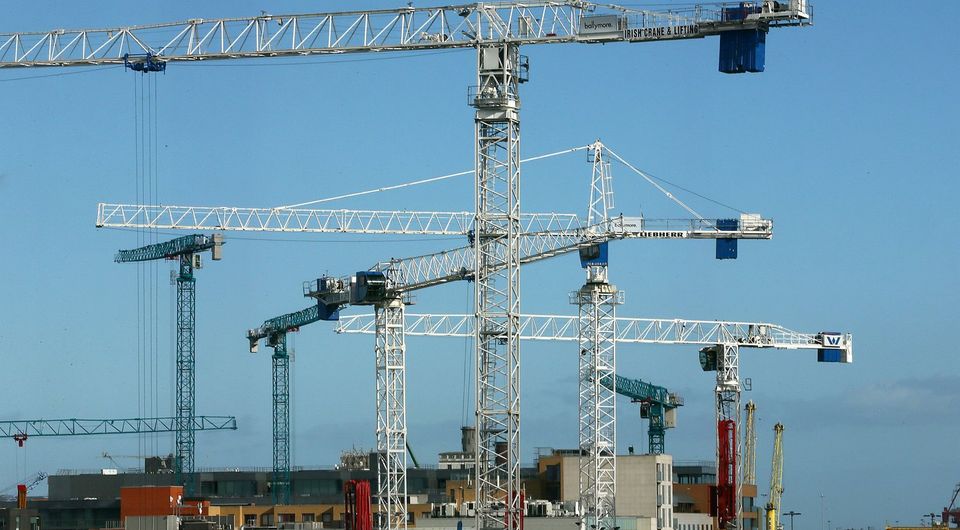Déjà-vu: Varadkar to use property boom to plug giant tax hole
History repeats: Stamp duty could replace ‘volatile’ corporation tax
Taoiseach Leo Varadkar (Brian Lawless/PA)
The Government will look to a housing construction boom to help cover a looming hole in corporation tax, the Taoiseach has said.
Leo Varadkar said that "as construction increases, as more houses are being built, the increased yield in stamp duty may help to compensate" for a fall in the corporation tax take.
The comments were last night branded "extraordinary" by the Opposition - given that a construction boom and subsequent crash was one of the main causes of financial meltdown a decade ago.
He made the claim on the same day the Government's own budget watchdog warned as much as 60pc of the €10bn corporation tax windfall could be temporary.
Embattled Housing Minister Eoghan Murphy is also facing a Dáil motion of no confidence next week.
Speaking in Tallaght yesterday, Mr Varadkar rejected the contention that Ireland is too reliant on corporation tax receipts.
‘Extraordinary’: Michael McGrath criticised Leo Varadkar’s views
"We need to continue to increase our budget surplus over the next couple of years so that we have a cushion in place should we find that corporation profit tax receipts fall and they're not picked up by a tax in some other area," he said.
"But obviously bear in mind as construction increases, as more houses are being built, the increased yield in stamp duty may help to compensate for some of that."
Fianna Fáil finance spokesman Michael McGrath criticised Mr Varadkar's remarks as "extraordinary", given the collapse of the economy a decade ago.
Ireland's economic collapse in 2008 was widely blamed by economists and subsequent inquiries on the State being too reliant on taxes derived from the construction sector such as stamp duty.
Yesterday, the Government was warned by the Irish Fiscal Advisory Council (IFAC) that up to €6bn - or 60pc of corporation tax windfall - could be temporary, leaving Exchequer finances massively exposed if there is any reversal.
IFAC's latest commentary is just one of several warnings the Government has been issued with in recent years about its over-reliance on a small number of multinationals paying large corporation tax bills.
Boom: Ireland’s economic collapse in 2008 was widely viewed as being due to the State’s over-reliance on taxes derived from the construction sector. Photo: Frank McGrath
Last night, Mr McGrath told the Irish Independent: "After all that we have been through, it is extraordinary that the Taoiseach seems to be suggesting that something of a house construction boom may be necessary to plug the hole in the public finances that a fall off in corporation tax could leave.
"The Government doesn't seem to understand that making permanent expenditure commitments on the back of receipts that could prove temporary is leaving us very exposed - that applies to stamp-duty receipts as it does to corporation tax from multinationals."
Mr Varadkar said only €10bn of the State's €70bn in tax revenue every year is from corporation tax.
"They're [IFAC] saying between €2bn and €6bn of that may not be sustainable. So you're talking about somewhere between €2bn and €6bn out of a budget of €70bn. So I wouldn't use the term too reliant. But it's absolutely a vulnerability."
He said the Government would also invest in infrastructure in the coming years in order to avoid having to make major outlays on capital projects in the future.
"If you invest in infrastructure, you only have to build it once. So that's investing in new schools, new roads, railways, healthcare facilities, all of those things. Once they're built, they're built, you don't need to find the money again next year," he said.
The Taoiseach said that he welcomed IFAC's report and stressed that it was important to listen to what the budget watchdog was saying as previous governments had ignored warnings about the economy.
But Mr McGrath said that Finance Minister Paschal Donohoe now needs to review his decision not to invest any money in the State's Rainy Day Fund next year, if a no-deal Brexit is avoided.
"Corporation tax changes proposed by the OECD are progressing quickly and there appears to be a global appetite now for change in this area. There is little doubt that Ireland will take a hit when these changes become a reality. We need to prepare now for changes that may come sooner than we expect," Mr McGrath said.
Meanwhile, Mr Varadkar refused to rule out asking Independent TD Noel Grealish to back Housing Minister Mr Murphy in a Dáil no confidence motion next week.
Mr Varadkar may have to rely on Independent deputies to save his Fine Gael colleague. Mr Grealish, who has caused controversy in recent weeks over remarks about African migrants, has often supported the Government in Dáil votes.
Asked whether he had spoken to Mr Grealish, the Taoiseach said: "I haven't yet, so I'll think about it. I haven't thought about it."
Join the Irish Independent WhatsApp channel
Stay up to date with all the latest news















